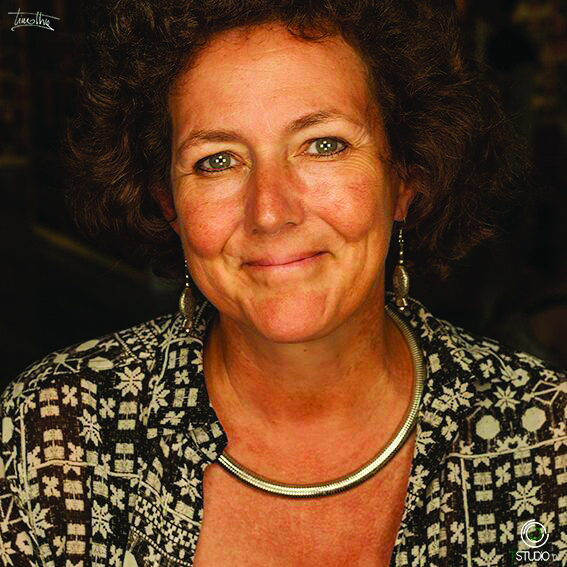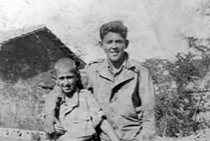On a cold and blustery day, I walk up the road to the Israeli hilltop village of Karmei Yosef. The journey that has brought me here has taken two years. I am on my way to meet Dani Chanoch, a Holocaust survivor. But I am here not just to understand the horrors of the ghettos and concentration camps, but also to learn of the struggle for survival after liberation.
Ever since I stumbled across a newspaper cutting describing how over a thousand Holocaust survivors boarded a secret ship, the Josiah Wedgwood, which sailed from the Italian Riviera under cover of darkness, I have realised that little was done to help those who survived. What support was available was mostly provided by the Jews themselves.
Chanoch is waiting for me outside his house. He immediately reminds me that it is 18 January, the anniversary of the day he was death-marched out of Auschwitz. He is smiling and affable and ushers me to his office at the top of the house. Quite the showman, he jokes: “I have a BA, you know! A Bachelor of Auschwitz.”
Chanoch was born in the Lithuanian city of Kovno, now known as Kaunas. When the Kovno ghetto was liquidated in July 1944, the Chanoch family were deported. His mother and sister were taken off the train at the Stutthof concentration camp in Poland. They were never seen again.
“This is the point our family ended. I did not say goodbye to my mother,” Chanoch tells me. “But if you want to survive, if you want to stay alive, there is no time for pain and suffering.”
Chanoch and his older brother were taken with their father, who did not survive, to the Kaufering sub-camp of Dachau. A month after his arrival at the labour camp, Chanoch was transferred to Auschwitz, among 131 boys considered too young to work. At the age of eleven, he was then put to work emptying trains of the belongings that prisoners were forced to leave behind.
At first, I think his story illustrates the randomness of survival, but I am soon corrected. As we eat Lithuanian krantz cake and drink coffee, Chanoch relates how he escaped two Nazi selections: one on Rosh Hashanah and one on Yom Kippur, 1944.
“The high holidays were the selection season. Once they came in with a stick and, if you were shorter than the stick, that was it,” he says matter-of-factly. When Chanoch met me outside his house, I had been struck by how tall he was, but there is more to his story.
“We tried to hide those who were shorter than the stick. We were all friends and we had solidarity. There is no one who survived without support, without help.” It is a lesson that survivors tell me again and again: friendship was the key to survival.
After the liberation, Chanoch still only had his friends to rely on. They lived a feral existence, joining up with other young boys who had survived the death marches.
The biggest challenge that I faced in researching the story of The People on the Beach was to find out who they were. Fortunately for me, although not for them, when the Wedgwood tried to smash through the Royal Navy blockade of Palestine, its passengers were arrested and taken to the Atlit detention centre near Haifa. There, their names, dates of birth and countries of origin were recorded.
The story of Chanoch and his friends only emerged from an historical blackhole when I met Jack Bursztain, who died in 2012, in the virtual world of Holocaust testimonies. Bursztain was born in 1927 in the Polish industrial city of Lodz, and, as his oral account details, was incarcerated in the Lodz ghetto then survived not only Auschwitz, but three death marches.
I discovered that such was the Nazi obsession with paperwork that there are lists of all those sent on death marches. Modern technology allows me to print copies of these documents and compare the names against online archives and the list of those who sailed on the Wedgwood. I began to search for the boys—over a hundred of them—accessing information in multiple languages that I do not speak using translation apps.
To my excitement, I discover on a German website that Wedgewood passenger Yechiel Aleksander is alive; a website in Hebrew reveals his address. I write him a letter in English, enclosing a Hebrew copy just in case.
A few days before my meeting with Chanoch, Aleksander, now 97, greets me over tea and cakes at his home in Pardes Hanna, central Israel. After the liberation, Aleksander tells me, he lived wild with other young boys in the station in Graz, southern Austria. “We went out in groups of eight to ten. We stole and swore and were very, very violent,” he says. They resorted to theft and blackmarketeering.
“We did not listen to anyone, not that anyone offered to help, until one day soldiers from the Jewish Brigade came and saved us.”
The Jewish Brigade was a British army unit of Jewish recruits from Palestine which fought its way through Italy. After the end of hostilities, they disobeyed orders and crossed into Austria to help the survivors. With Stars of David painted on their guns and jeeps, the Brigade left Aleksander and his teenage friends in awe. The boys agreed to be smuggled across the Italian border in their British army trucks.
They were taken to a children’s home in Fiesole—a hilltop town overlooking Florence—where they spent a few months before being selected by the Jewish underground to sail on the Wedgwood. Chanoch was also taken to Fiesole, where he was reunited with his brother.
When I mention Fiesole, Aleksander reaches both arms out across the table. When I ask what Italy meant to him, he jumps up from his chair in amazement and replies: “Amore! Civilizzazione!” The Italians welcomed them with open arms and did everything they could to help.
Chatting with Chanoch in his home, I realise the Holocaust is not a story from the past that needs remembering. It is one that survivors and their families live with every day.
Chanoch gives me a lift to Ramlah bus station but decides not to take the main road as he wants to show me the flowers in the woods. I wonder how many there can be on this cold January day, but as the car winds down the country lane he points to a graveyard. “This is where I will be buried,” he says. “I have already had a mock funeral.”
“I want to know exactly where I will be buried and what will happen to me. My family did not have that luxury.” This is the lesson he wants me to learn: he wants control over his own destiny.
The People on the Beach | Hardback | September 2020 | £20 | 9781787383777 | 416pp

Rosie Whitehouse, a journalist, writes about Holocaust survivors for BBC Online, the Observer, Tablet magazine,
